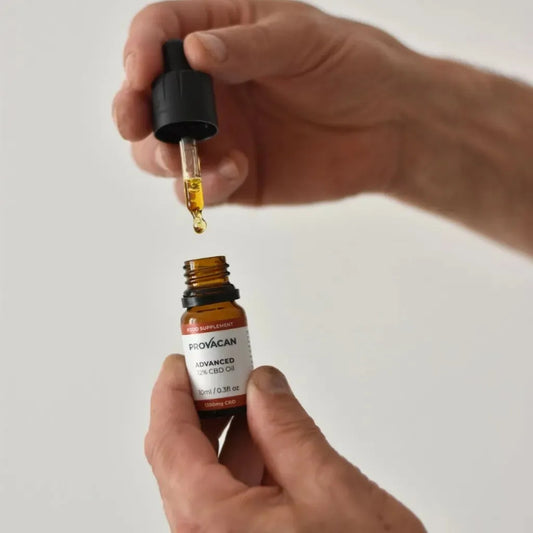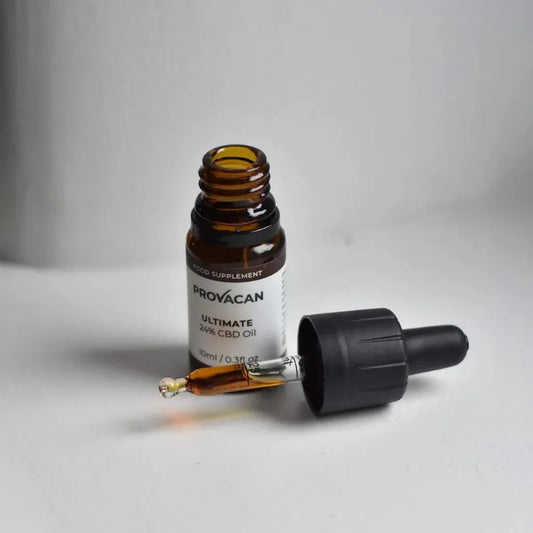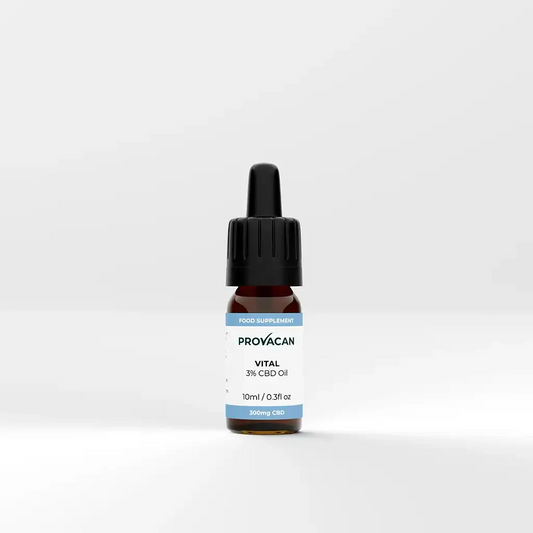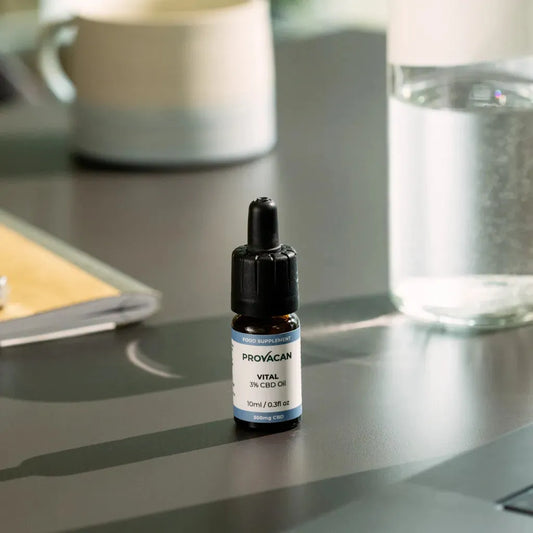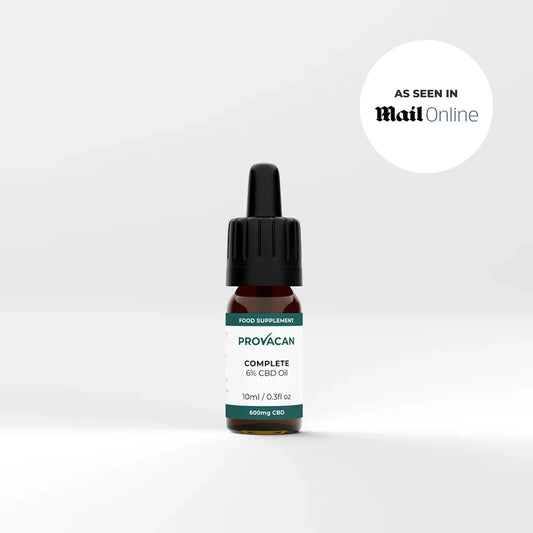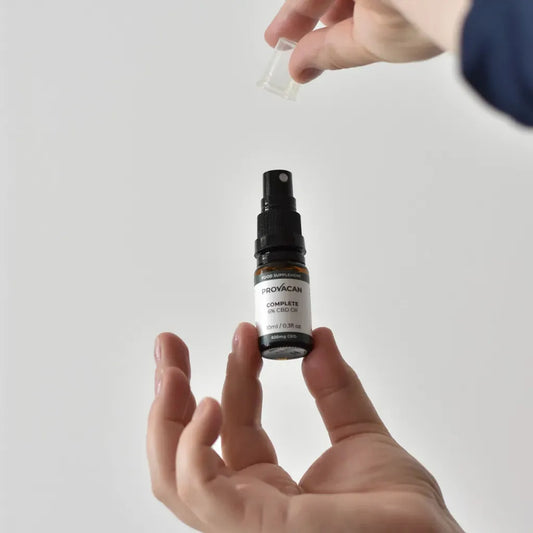Key Takeaways:
- RSO Oil: RSO, or Rick Simpson Oil, is a potent cannabis extract known for its high concentrations of THC and CBD.
- Therapeutic Benefits: RSO oil is used as a natural remedy for pain, inflammation, anxiety, insomnia, and other health conditions.
- Extraction Process: Derived using a specific extraction method, RSO oil offers a strong potency and reported therapeutic effects, making it a popular choice in alternative medicine.
Welcome to the comprehensive guide on RSO oil. RSO has gained immense popularity in the wellness and alternative medicine community for its potential health benefits. This potent cannabis extract is known for its high concentration of cannabinoids, particularly tetrahydrocannabinol (THC) and cannabidiol (CBD), making it a go-to choice for individuals seeking relief from various health conditions.
As an expert in the cannabidiol space, we at Provacan will uncover the origins of RSO oil, its extraction methods, potential benefits, and how it differs from other cannabis-based products. Whether you are a seasoned CBD consumer or new to exploring the world of cannabinoids, this guide aims to provide you with a deeper understanding of RSO oil and its role in promoting overall well-being.
Overview of RSO Oil
RSO oil, short for Rick Simpson Oil, is a concentrated form of cannabis oil that has gained popularity for its potential health benefits. Named after Rick Simpson, who popularized its use, RSO oil is typically made using high-THC cannabis strains in a specific extraction process.
One of the key characteristics of RSO oil is its high THC content, which distinguishes it from other CBD oils on the market. The high THC levels in RSO oil are believed to contribute to its potential medicinal properties, including pain relief, anti-inflammatory effects, and potential cancer-fighting properties.
Many advocates of RSO oil claim that it can help manage various medical conditions, including chronic pain, arthritis, multiple sclerosis, and cancer symptoms. However, it is essential to note that research on the efficacy and safety of RSO oil is still limited, and users should exercise caution when using it as a treatment option.
The Origins of RSO: Rick Simpson's Story
Rick Simpson, a medical marijuana activist and engineer, is credited with popularizing RSO. His journey with RSO began in 2003 when he was diagnosed with skin cancer. After not finding relief from traditional medical treatments, Simpson turned to cannabis for help. He created his own cannabis oil extraction method, now known as RSO, and began applying it topically to his skin cancer.
To his amazement, Simpson claimed that his skin cancer disappeared within a few days of using RSO. This personal success inspired him to share his method with others. He began producing and distributing RSO to individuals battling various ailments, mostly cancer.
Simpson's method involved using high-THC cannabis strains for extraction, which he believed had potent medicinal properties. He advocated for the use of RSO not only for cancer but also for other conditions like chronic pain, multiple sclerosis, and more. Simpson's advocacy and personal anecdotes quickly spread, leading to the widespread recognition of RSO within the medical cannabis community.
While scientific research on RSO is still ongoing, anecdotal evidence and testimonies from individuals like Rick Simpson have fueled interest and support for this cannabis oil. Simpson's story continues to inspire many to explore the potential benefits of RSO in managing various health issues.
The Production of RSO Oil
What is RSO Oil Made From?
RSO oil, short for Rick Simpson Oil, is a cannabis extract that is renowned for its potent concentrations of cannabinoids, particularly THC (tetrahydrocannabinol). The primary raw material for RSO oil is high-quality, high-THC cannabis flower. The flower is typically dried and ground before the extraction process begins.
How is RSO Oil Made?
The method of producing RSO oil involves the use of high-proof alcohol as a solvent to extract cannabinoids from the cannabis plant material. The ground cannabis is soaked in alcohol, which dissolves the cannabinoids and other beneficial compounds present in the plant material. The mixture is then strained to remove the plant material, leaving behind a liquid rich in cannabinoids.
This liquid is heated to evaporate the alcohol, resulting in a highly concentrated cannabis oil that is dark, sticky, and dense in consistency. Safety measures should be followed due to the flammable nature of alcohol solvents when producing RSO oil.
The Claimed Medical Benefits of RSO
1. Potential Cancer-Fighting Properties
Advocates of RSO oil suggest that it has the potential to inhibit cancer cell growth and enhance the effectiveness of traditional cancer treatments. The oil is believed to contain compounds that may aid in fighting off cancer cells.
2. Pain Relief
RSO oil is highly regarded for its potential to provide relief from chronic pain. By interacting with the body's endocannabinoid system, the oil may help alleviate discomfort and improve overall well-being.
3. Anti-Inflammatory Effects
The anti-inflammatory properties of RSO oil are thought to be beneficial for individuals dealing with conditions such as arthritis, multiple sclerosis, and inflammatory bowel disease. It may help reduce inflammation in the body, easing symptoms and promoting better health.
Scientific Evidence Supporting RSO Oil's Efficacy
Research into the potential benefits of RSO oil continues to gain momentum, with several studies highlighting its efficacy in various health conditions. Here are some key studies and findings that support the use of RSO oil:
Cancer Treatment: A study published in the Journal of Pharmacology & Pharmacy indicated that RSO oil showed promising results in inhibiting the growth of cancer cells in vitro. The researchers found that RSO oil induced apoptosis (cell death) in cancer cells, suggesting its potential as an adjunct therapy in cancer treatment.
Pain Management: A clinical trial conducted by the European Journal of Pain concluded that RSO oil significantly reduced pain levels in patients with chronic pain conditions. The study demonstrated that RSO oil's anti-inflammatory properties effectively alleviated pain without the adverse side effects commonly associated with traditional pain medications.
Neurological Disorders: Research published in Neurotherapeutics explored the use of RSO oil in managing neurological disorders such as epilepsy and multiple sclerosis. The study reported that RSO oil's neuroprotective properties played a crucial role in reducing seizure frequency and improving overall neurological function in patients with epilepsy.
Anxiety and Depression: A systematic review published in Frontiers in Immunology highlighted the anxiolytic and antidepressant effects of RSO oil due to its interaction with the endocannabinoid system. The review concluded that RSO oil could be a potential therapeutic option for individuals struggling with anxiety and depression.
These studies underscore the growing body of scientific evidence supporting the efficacy of RSO oil in promoting overall health and well-being. As research in this area continues to evolve, RSO oil remains a promising natural alternative for individuals seeking holistic wellness solutions.
Potential Risks and Side Effects of RSO Oil
When considering the use of RSO oil, it is important to be aware of potential risks and side effects. While RSO oil has been praised for its potential health benefits, it may not be suitable for everyone and can lead to adverse effects in some individuals.
Psychoactive Effects: RSO oil contains high levels of THC, the psychoactive compound found in cannabis. This can result in psychoactive effects such as euphoria, changes in perception, and impairment of cognitive function.
Cognitive Impairment: Due to its high THC content, RSO oil can impair cognitive function, leading to issues with concentration, memory, and decision-making.
Cardiovascular Effects: THC found in RSO oil can temporarily increase heart rate, which may pose risks to individuals with cardiovascular issues or high blood pressure.
Respiratory Irritation: Smoking or vaporizing RSO oil can irritate the respiratory system, leading to coughing, throat irritation, and respiratory discomfort.
Digestive Upset: Ingesting RSO oil can sometimes lead to digestive issues such as nausea, abdominal pain, and diarrhea. It is recommended to start with a low dose and gradually increase to assess tolerance levels.
Before incorporating RSO oil into your wellness routine, it is crucial to consult with a healthcare professional, especially if you have underlying health conditions or are taking medications that may interact with RSO oil. Monitoring for any adverse effects and adjusting dosage as needed can help minimize risks and ensure a safe experience with RSO oil.
Legal Considerations
In the United Kingdom, the use of RSO oil is restricted due to its high THC content. Cannabis is classified as a controlled substance under the UK Misuse of Drugs Act 1971, making it illegal to possess, produce, or supply cannabis and cannabis-based products. This includes RSO oil, which falls under these regulations.
In countries where medical cannabis is legal, such as some states in the US and certain European countries, RSO oil may be legally available with a prescription from a licensed healthcare provider. However, it's essential to familiarize yourself with the specific regulations and laws governing medical cannabis in your region to ensure compliance.
Read also:
Frequently Asked Questions on RSO Oil
What is RSO oil?
RSO oil, or Rick Simpson Oil, is a concentrated form of cannabis oil known for its high THC content. It is named after Rick Simpson, a Canadian medical marijuana activist who created the oil to treat his own health conditions.
How is RSO oil made?
RSO oil is made by extracting the cannabinoids, including THC, from cannabis plants using a solvent like ethanol or isopropyl alcohol. The plant material is soaked in the solvent, which pulls out the cannabinoids. The solvent is then evaporated, leaving behind a thick, potent oil rich in cannabis's active compounds.
Who created RSO oil?
Rick Simpson, a Canadian engineer turned medical marijuana advocate, created RSO oil. After being diagnosed with a form of skin cancer in 2003, Simpson developed his namesake oil and applied it to his skin, claiming the cancerous growths disappeared within days. He then began promoting his discovery to help others with similar ailments.
What are the main components of RSO oil?
The main components of RSO oil are THC (tetrahydrocannabinol) and various other cannabinoids found in the cannabis plant. Unlike CBD oil, which is high in cannabidiol and low in THC, RSO oil contains high levels of THC in addition to CBD, CBG, CBN, and terpenes, which contribute to its potent effects.
Is RSO oil the same as CBD oil?
No, RSO oil is not the same as CBD oil. While both are derived from the cannabis plant, RSO oil contains high levels of THC, the psychoactive cannabinoid responsible for the "high" associated with marijuana use. In contrast, CBD oil is high in cannabidiol (CBD), a non-psychoactive cannabinoid, and contains minimal THC.
Can RSO oil get you high?
Yes, due to its high THC content, RSO oil can produce psychoactive effects, or a "high," when consumed. The intensity of the high depends on the amount of oil consumed and the individual's tolerance to THC.
What are the potential benefits of using RSO oil?
While scientific research on RSO oil is limited, anecdotal evidence suggests it may help manage symptoms associated with a variety of medical conditions, including chronic pain, inflammation, arthritis, insomnia, and certain types of cancer. Users also report relief from anxiety and depression.
Are there any side effects of using RSO oil?
As with any cannabis-based product, potential side effects of RSO oil include dry mouth, red eyes, increased heart rate, coordination problems, and feelings of anxiety or paranoia, particularly at high doses.
How do you use RSO oil?
RSO oil can be consumed orally, applied topically, or inhaled via vaporization. When ingesting, it's important to start with a small amount due to its potency and gradually increase the dosage as needed. For topical application, it can be applied directly to the skin or mixed with a carrier oil or cream before applying.
Is RSO oil legal?
The legality of RSO oil depends on the laws governing cannabis in your region. In places where medical or recreational cannabis is legal, RSO oil may also be legally obtained and used. However, due to its high THC content, it remains illegal in jurisdictions with strict cannabis regulations.





